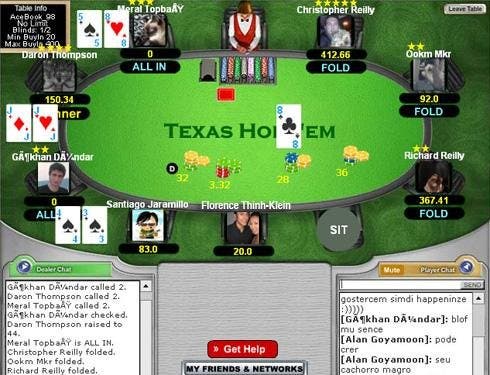Play Your Cards Right
What's behind the boom in online poker?
The supposed death of PC gaming has been predicted ad nauseam. However, every day millions of people all over the world switch on their computers and play a massively multiplayer turn-based strategy game. And we're not talking about Farmville.
Online poker may strike fear into the heart of neo-con America, but the last decade has seen its popularity explode. The game is now enjoyed by a wide demographic, one that includes more traditional gamers.
Indeed, a survey conducted by The Poker Channel revealed that over 70 per cent of its audience plays both poker and videogames at least once a week. Furthermore, their average gaming viewer buys between five and eight games a year, and plays for more than five hours per week.
Predictably the key platforms are PS3, Xbox 360 and PC. The most popular games are Call of Duty, FIFA, World Of Warcraft and Grand Theft Auto. Given this evident crossover, the channel is planning to launch a bespoke videogames show to complement its poker-based broadcasts.
While the perennially parlous games industry seems to lurch from crisis to crisis, online poker has been through its own peaks and troughs. At the height of the poker boom in the middle of the last decade, leading operator Party Poker was believed to be turning over $1m a day.
But US Congress seriously curtailed this in 2006 with the introduction of the Unlawful Internet Gambling Enforcement Act, which effectively outlawed poker sites from taking money from US-based players. Some sites lost up to 80 per cent of their customers overnight. In gaming terms, it's the equivalent of Americans being banned from playing massively multiplayer online games (arguably no bad thing).

However, two privately owned companies effectively ignored the ruling and instantly became market leaders. At the time of writing there are 181,165 people currently playing on PokerStars. The figure for Full Tilt Poker stands at 82,453. Bearing in mind that each player pays 10 per cent of his or her entry fee to the operator, it's a business model arguably on a par with a successful MMO.
The MMO comparisons don't end there. Online poker has its roots in text-based programs of the late nineties, back before more graphically advanced iterations appeared.
One company blurring the line between gaming and poker is Camden-based PKR, which recently celebrated its fourth birthday. Shunning the perfunctory 2D graphics of rival offerings, PKR is an all-singing, all-dancing 3D affair with customisable avatars, emotes, speech, chicken noises, loser signs, funky dancing and a lot of the things you'd associate with an MMO character - albeit sat at a poker table in one of a variety of locales, both exotic and mundane. A future update even promises an achievements system, which unlike Microsoft's, will offer tangible rewards.
Perhaps unsurprisingly, PKR's founders have their roots in the videogames industry. The company was set up by six industry veterans including ex-EA employee Jeremy Longley, Jez San (who put the money up) and Leon Walters, both formerly of Argonaut.
"Some of us were poker players and we thought all poker software out there at the time was crap," explains Walters. "We thought, 'We could do better than that, we can make it entertaining.'
"I brought a kind of massively multiplayer sensibility from a design perspective, whereas Jeremy and Jez were about making sure the core poker experience was what it needed to be. We had the right skills; we'd been making videogames probably between us for over a hundred years.
